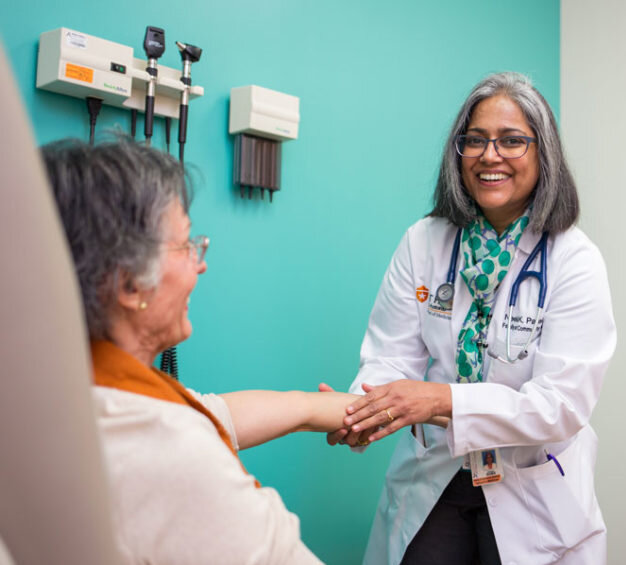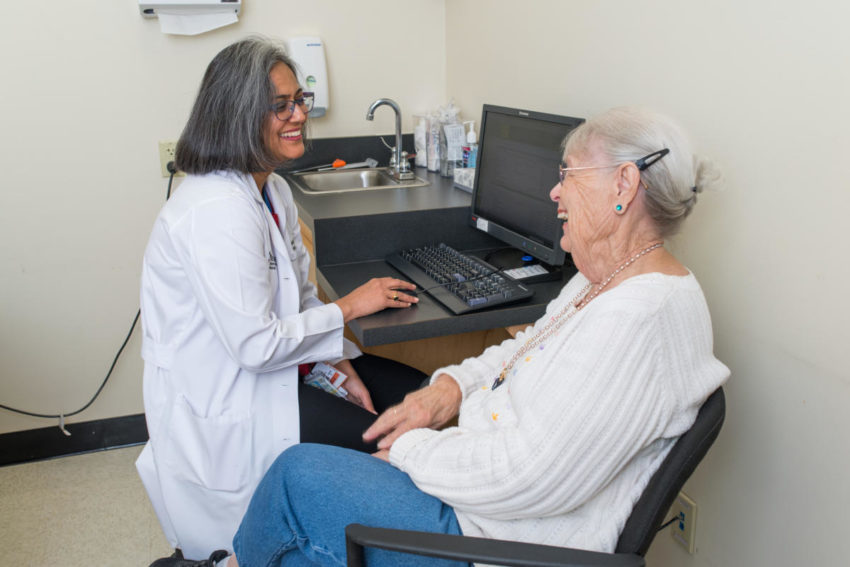Hospitalizations and ER visits were reduced by integration of promotores into supportive care
Contact: Will Sansom, 210-567-2579, sansom@uthscsa.edu
SAN ANTONIO (July 24, 2023) — Staying healthy and connected was difficult for everyone during the COVID-19 pandemic, but especially so for homebound older patients and their caregivers. Fortunately, a program developed by the geriatrics and supportive care team of The University of Texas Health Science Center at San Antonio effectively integrated community health workers (promotores de salud in Spanish) into patient outreach to improve health. Thanks to the program, annual visits to older adults with type 2 diabetes, dementia and other health issues in underserved areas of Bexar County doubled from pre-pandemic levels.
The program, described July 24 in Annals of Family Medicine, resulted in a 17% reduction in inpatient hospital admissions and an 11% decline in emergency room visits among the homebound patients served. Most of the patients seen by the practice are older than 85.

“Promotores act as a bridge,” said Neela K. Patel, MD, MPH, CMD, FAAFP, associate professor of family and community medicine at UT Health San Antonio and chief of the Division of Geriatrics and Supportive Care. “They communicate to the patient who we are and what our role is, and how we are trying to support the patient, and they communicate the family’s and the patient’s concerns to us. It helps us to respect the patient’s choices and values and provide care that is respectful from a patient’s perspective and not from our perspective.”
Visits typically aren’t made by a promotora (a female CHW) and a physician together. When the doctor sees that a patient needs assistance beyond medical care, such as with various kinds of community resources, a promotora is assigned to help with those issues.
“The patients we serve may need help with caregivers, with getting benefits sorted out, with medications, with transportation or with starting Meals on Wheels,” Patel said. “We ask the promotora to either go before us or between our visits to the home.”
Long and Biggs endowed chairs
Patel, senior author of the research, holds two endowed faculty chairs at UT Health San Antonio: the Joe R. and Teresa Lozano Long Chair in Geriatrics and Community Senior Care and the Glenn and Ann Biggs Distinguished Chair in Alzheimer’s Patient Care.
She said older patients may have difficulty remembering and following a physician’s advice.
“If the individual’s diabetes isn’t getting any better, or the caregiver for a person with dementia is having problems with behavior and all that, then the promotora goes and visits with them and gets us the inside story,” Patel said. “It really helps us take better care of our patients.”
Staying out of the hospital
Preventing ER visits and hospital stays is one of the community health worker’s key roles.
“Basically, promotores have the trust and the relationship, and they reinforce with the patients and caregivers that they are available to them 24/7,” Patel said.
When a patient or caregiver has difficulty reaching the office, he or she has a direct line with the promotora.
“A caregiver may let us know that the patient is very sick but doesn’t want to go to the ER,” Patel said. “The caregiver asks if we can do a same-day visit with them. We have three physicians and four nurse practitioners, one of whom will then be assigned to make the visit.”
Older patients who are homebound don’t want to go to the hospital. “In fact, when it is really needed, we have to tell them, ‘You know, I really wish I could give you all the treatment here, but I cannot,’” Patel said. “‘The best thing for you is to go to the hospital, and I will get you directly admitted, or I will talk to the ER doctors so you don’t have to wait so long.’”
Grants added promotores
The Division of Geriatrics and Supportive Medicine began the integration of community health workers into older patient care by partnering with a San Antonio not-for-profit called the House of Neighborly Service that had two CHWs. A grant from Impact San Antonio assisted the process.
Over time, the division added its own promotores as well as nurse practitioners. A grant from the Nancy Smith Hurd Foundation enabled the hiring of the first promotores.
The Glenn Biggs Institute for Alzheimer’s and Neurodegenerative Diseases at UT Health San Antonio helped the division to hire another promotora.
Developing and following a care plan
Patients who need supportive care are seen frequently.
“They are very frail and burdened with advanced dementia, heart disease, heart failure or COPD, and they really don’t want to go to the hospital,” Patel said.
“That’s why we see them frequently admitted to our supportive care program,” she said. “After we have a care plan, the promotora makes sure that they follow it.”
Each promotora follows about 10 to 12 patients monthly. When a patient’s care stabilizes, the promotora moves on to other patients who need more frequent visits.
Visits by promotores are documented in the practice’s electronic medical record. This reflects the integration of promotores into the geriatric and supportive care team.
Clinicians and Promotores Teaming to Provide In-Home Primary Care to Frail Older Adults
, , , , , and
First published: July 24, 2023, The Annals of Family Medicine
https://www.annfammed.org/content/21/4/377
The University of Texas Health Science Center at San Antonio (UT Health San Antonio) is one of the country’s leading health science universities and is designated as a Hispanic-Serving Institution by the U.S. Department of Education. With missions of teaching, research, patient care and community engagement, its schools of medicine, nursing, dentistry, health professions, public health and graduate biomedical sciences have graduated more than 42,200 alumni who are leading change, advancing their fields and renewing hope for patients and their families throughout South Texas and the world. To learn about the many ways “We make lives better®,” visit UTHealthSA.org.
The UT Health San Antonio Joe R. and Teresa Lozano Long School of Medicine is listed among U.S. News & World Report’s best medical schools, ranking in the top 30% nationwide for research. To learn more, visit https://uthscsa.edu/medicine/.
Stay connected with The University of Texas Health Science Center at San Antonio on Facebook, Twitter, LinkedIn, Instagram and YouTube.



